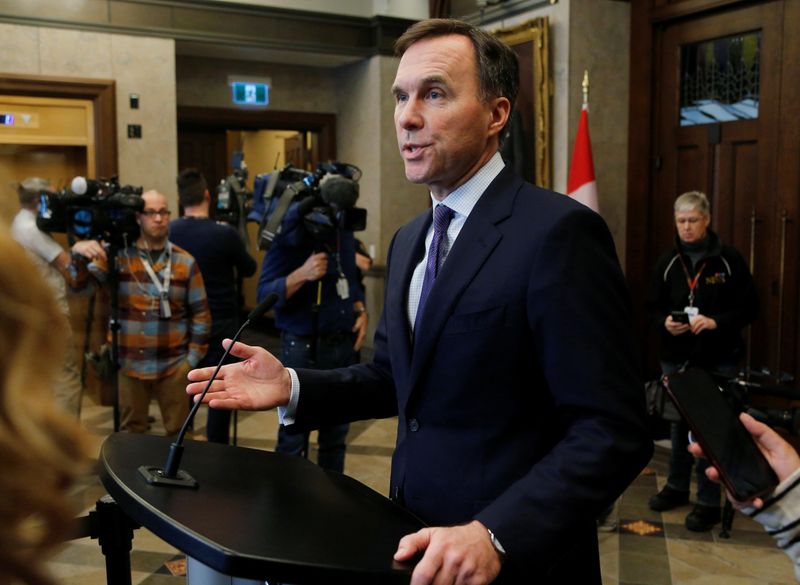By Fergal Smith
TORONTO (Reuters) - Canada will preserve its fiscal firepower even as it takes measures to help those who are hit by the coronavirus outbreak, the finance minister said on Friday as the spread of the virus reached a new phase.
"Canada, more so than any other country in the G7, has economic resiliency and fiscal firepower at its disposal," Bill Morneau told business leaders in Toronto. Morneau is due to present the budget by the end of the month.
"We intend on maintaining this advantage. This means that we will be judicious and responsible in how we make investments in this budget."
But Morneau has also said he is worried about economic damage to the energy and tourism industries.
Chinese tourists generate about C$2 billion ($1.5 billion)annually in Canada, but their numbers have dwindled and revenue from their visits is expected to be down by C$550 million by June, Tourism Minister Melanie Joly told reporters in Montreal.
There are now 51 confirmed cases of COVID-19 in Canada, and British Columbia on Thursday reported a woman who had not traveled outside the country had contracted the disease, making it the first possible case of local transmission.
On Friday, the first possible case of spread from the United States was reported.
Chief Medical Officer Theresa Tam advised Canadians to think twice before taking cruises.
"Cruise ships present environments where COVID-19 can spread easily, given close contacts between passengers and crew for significant periods of time," she told reporters, saying the elderly were particularly vulnerable.
In just a month, the virus has changed Canada's economic outlook, Morneau said, as he pledged government support for those who are forced into quarantine. The specifics of the planned assistance will be announced soon, he added.
Also due to the virus, Morneau said he would increase the risk provision in the budget. Canada includes a cushion in its annual spending package for risk, which in December was set at C$3 billion for the upcoming fiscal year.
Though Morneau said he would rather do too much than too little amid uncertainty over the economic impact of the virus, he stopped well short of promising a wave of fiscal stimulus.
He repeated on Friday that the debt-to-GDP ratio would continue to decline.
Bank of Canada Governor Stephen Poloz on Thursday said the country's economic resiliency would be "seriously tested" by the epidemic.
On Wednesday, the central bank slashed its overnight lending rate and said it was prepared to cut further if necessary.
The Canadian dollar weakened on Friday against its U.S. counterpart and government bond yields tumbled as concerns about the coronavirus impact grew, even after data showed Canada's employers added more jobs in February than expected.
In a sign of potential future economic challenges, Statistics Canada on Friday said January trade data showed substantial decreases in exports and imports with China.
